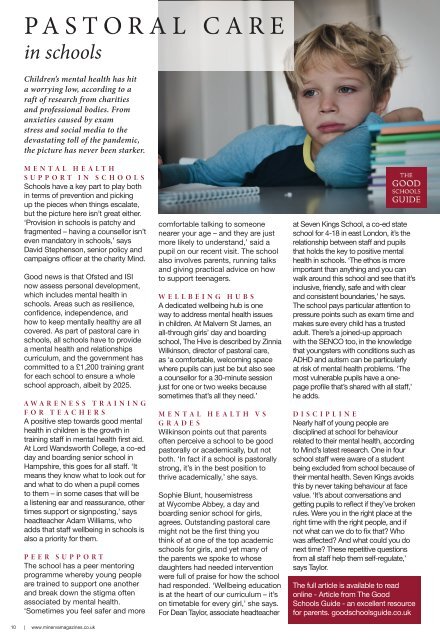Banbury Living Apr - May 2024
Create successful ePaper yourself
Turn your PDF publications into a flip-book with our unique Google optimized e-Paper software.
PASTORAL CARE<br />
in schools<br />
Children’s mental health has hit<br />
a worrying low, according to a<br />
raft of research from charities<br />
and professional bodies. From<br />
anxieties caused by exam<br />
stress and social media to the<br />
devastating toll of the pandemic,<br />
the picture has never been starker.<br />
MENTAL HEALTH<br />
SUPPORT IN SCHOOLS<br />
Schools have a key part to play both<br />
in terms of prevention and picking<br />
up the pieces when things escalate,<br />
but the picture here isn’t great either.<br />
‘Provision in schools is patchy and<br />
fragmented – having a counsellor isn’t<br />
even mandatory in schools,’ says<br />
David Stephenson, senior policy and<br />
campaigns officer at the charity Mind.<br />
Good news is that Ofsted and ISI<br />
now assess personal development,<br />
which includes mental health in<br />
schools. Areas such as resilience,<br />
confidence, independence, and<br />
how to keep mentally healthy are all<br />
covered. As part of pastoral care in<br />
schools, all schools have to provide<br />
a mental health and relationships<br />
curriculum, and the government has<br />
committed to a £1,200 training grant<br />
for each school to ensure a whole<br />
school approach, albeit by 2025.<br />
AWARENESS TRAINING<br />
FOR TEACHERS<br />
A positive step towards good mental<br />
health in children is the growth in<br />
training staff in mental health first aid.<br />
At Lord Wandsworth College, a co-ed<br />
day and boarding senior school in<br />
Hampshire, this goes for all staff. ‘It<br />
means they know what to look out for<br />
and what to do when a pupil comes<br />
to them – in some cases that will be<br />
a listening ear and reassurance, other<br />
times support or signposting,’ says<br />
headteacher Adam Williams, who<br />
adds that staff wellbeing in schools is<br />
also a priority for them.<br />
PEER SUPPORT<br />
The school has a peer mentoring<br />
programme whereby young people<br />
are trained to support one another<br />
and break down the stigma often<br />
associated by mental health.<br />
‘Sometimes you feel safer and more<br />
10 | www.minervamagazines.co.uk<br />
comfortable talking to someone<br />
nearer your age – and they are just<br />
more likely to understand,’ said a<br />
pupil on our recent visit. The school<br />
also involves parents, running talks<br />
and giving practical advice on how<br />
to support teenagers.<br />
WELLBEING HUBS<br />
A dedicated wellbeing hub is one<br />
way to address mental health issues<br />
in children. At Malvern St James, an<br />
all-through girls’ day and boarding<br />
school, The Hive is described by Zinnia<br />
Wilkinson, director of pastoral care,<br />
as ‘a comfortable, welcoming space<br />
where pupils can just be but also see<br />
a counsellor for a 30-minute session<br />
just for one or two weeks because<br />
sometimes that’s all they need.’<br />
MENTAL HEALTH VS<br />
GRADES<br />
Wilkinson points out that parents<br />
often perceive a school to be good<br />
pastorally or academically, but not<br />
both. ‘In fact if a school is pastorally<br />
strong, it’s in the best position to<br />
thrive academically,’ she says.<br />
Sophie Blunt, housemistress<br />
at Wycombe Abbey, a day and<br />
boarding senior school for girls,<br />
agrees. Outstanding pastoral care<br />
might not be the first thing you<br />
think of at one of the top academic<br />
schools for girls, and yet many of<br />
the parents we spoke to whose<br />
daughters had needed intervention<br />
were full of praise for how the school<br />
had responded. ‘Wellbeing education<br />
is at the heart of our curriculum – it’s<br />
on timetable for every girl,’ she says.<br />
For Dean Taylor, associate headteacher<br />
at Seven Kings School, a co-ed state<br />
school for 4-18 in east London, it’s the<br />
relationship between staff and pupils<br />
that holds the key to positive mental<br />
health in schools. ‘The ethos is more<br />
important than anything and you can<br />
walk around this school and see that it’s<br />
inclusive, friendly, safe and with clear<br />
and consistent boundaries,’ he says.<br />
The school pays particular attention to<br />
pressure points such as exam time and<br />
makes sure every child has a trusted<br />
adult. There’s a joined-up approach<br />
with the SENCO too, in the knowledge<br />
that youngsters with conditions such as<br />
ADHD and autism can be particularly<br />
at risk of mental health problems. ‘The<br />
most vulnerable pupils have a onepage<br />
profile that’s shared with all staff,’<br />
he adds.<br />
DISCIPLINE<br />
Nearly half of young people are<br />
disciplined at school for behaviour<br />
related to their mental health, according<br />
to Mind’s latest research. One in four<br />
school staff were aware of a student<br />
being excluded from school because of<br />
their mental health. Seven Kings avoids<br />
this by never taking behaviour at face<br />
value. ‘It’s about conversations and<br />
getting pupils to reflect if they’ve broken<br />
rules. Were you in the right place at the<br />
right time with the right people, and if<br />
not what can we do to fix that? Who<br />
was affected? And what could you do<br />
next time? These repetitive questions<br />
from all staff help them self-regulate,’<br />
says Taylor.<br />
The full article is available to read<br />
online - Article from The Good<br />
Schools Guide - an excellent resource<br />
for parents. goodschoolsguide.co.uk


















